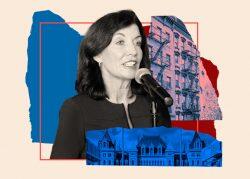Gov. Kathy Hochul ushered in a fresh set of protections for New York tenants last week.
After the rent-law overhaul of 2019 and the eviction moratorium of 2020 and 2021, they are not earth-shattering. Real estate, however, views the move as foreshadowing.
With Hochul’s re-election run just one year out, landlord groups foresee the governor — a western New York moderate — working to align with the left on housing, a shift that could push through tenant advocates’ holy grail: good cause eviction.
Of the two bills Hochul signed Friday, landlords see the one concerning rent stabilization as writing on the wall. The legislation ensures that stabilized leases cannot be voided or used as collateral if a tenant files for bankruptcy.
The governor, in a statement, championed the law as a step toward ensuring housing for those in tough situations.
Hochul has been known as a moderate, Western New York Democrat throughout her political career, which included a stint in the House of Representatives. Landlords viewed Hochul’s trumpeting of the two bill signings as a political recalibration — leftward.
“As usual, sensible and sound housing policy is taking a back seat to politics and political pandering — no matter who holds the pen in Albany,” said Joseph Strasburg, president of the Rent Stabilization Association.
Read more


Jay Martin, executive director of the Community Housing Improvement Program, said Hochul knows that to win the governor’s race “she will probably have to run against her own archetype.”
“She is under tremendous pressure to run as left as she can to get the Democratic nomination as cleanly as possible,” he said.
A key to gaining the left’s support, Martin said, is passing good cause eviction.
The bill, which has stalled in the Senate Judiciary Committee, would prohibit a landlord from evicting a tenant or denying a lease renewal without good cause, such as if a tenant failed to pay the rent. But non-payment would not be considered “good cause” if the rent were raised more than 150 percent of the inflation rate or 3 percent, whichever is higher. For that reason, the real estate industry calls the proposed legislation statewide rent control.
Recently, local bills have gained steam. Albany passed a version of good cause in July. Rochester, Buffalo Hudson and New Paltz are considering similar bills.
Backers of the state measure are trying to build momentum. This month, state Sen. Jabari Brisport, speaking at an anti-landlord rally in Park Slope, pledged to pass good cause next session.
New York City Public Advocate Jumaane Williams, who has all but announced a run for governor, joined Hudson Mayor Kamal Johnson at a press conference for the measure this summer, potentially pressuring fellow Democrat Hochul to support it.
The governor’s office did not respond to a request for comment in time for publication.
In the near term, Martin added that the legislation will strengthen the organization’s challenge of the 2019 rent law.
Its suit argues that the law violates the Fifth Amendment by allowing the government to take private property without compensation, thereby forcing private landlords to subsidize a public benefit.
A rent-stabilized lease can be worth tens of thousands of dollars and sometimes more to a landlord who badly wants a tenant out. Tenants occasionally accept such buyouts. The bill Hochul signed prevents that asset from being sold in bankruptcy against the will of a tenant who files for personal bankruptcy.
“This law is saying that rent-stabilization is so sacrosanct that we’re going to protect it even from debt collection,” Martin said. “That’s doubling down on the idea that it’s a public benefit.”
Martin said CHIP would be incorporating the law into its suit, which is awaiting arguments in the Second Circuit.
The second piece of legislation enacted by Hochul allows renters to sue their landlord in the same small claims court where they rent. Previously, a tenant seeking legal action over an unrefunded security deposit, for example, would have had to file suit in the jurisdiction where their landlord’s business is located.
For tenants whose landlords live out of state, the prior law had made litigation difficult, if not impossible.
